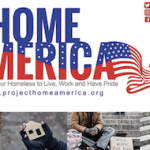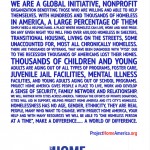Kerry McBride at her home in Arlington, Va., on Jan. 5. During frigid weather, she worries even more about her son, who has paranoid schizophrenia and is homeless. (Carolyn Van Houten/The Washington Post)
Another morning of questions began with the most basic of them all. Where was her son? Was he okay? Or was he frozen on some street corner?
Kerry McBride, 46, looked outside. The windows of her Arlington, Va., townhouse were fogged over, but she could see that the ground was covered with snow. It was 25 degrees, the temperature was expected to sink into the teens by the next day, and here she was, fretting, while her boy was out there, somewhere.
The questions were always with her, but they haunted her on days like today, when McBride, a career State Department employee, was home from work with nothing to do while she recovered from a recent surgery but dwell on what had happened to Michael, a 23-year-old with paranoid schizophrenia experiencing his first winter of homelessness. She thought about how quickly the illness had seized him. And how, in just three years, he had gone from a sweet and loving college student to delusional, homeless and alone.
“I’ve got to see him,” she was saying again and again. “I’ve got to see him.”
In a country where homelessness remains intractable, and where expensive cities such as Washington have experienced surging numbers of homeless in the past decade, people like McBride have become hidden casualties — consumed by worry and frustration, unable to get relatives to come inside from the cold, dreading that the phone will ring and someone will tell them that their sons or daughters or spouses have died on the street, and they hadn’t been able to stop it.
McBride had sworn to herself that she would do everything she could to make sure that didn’t happen. She had involuntarily hospitalized him. She had taken him to so many psychiatrists. And after Michael disappeared, she had called everywhere she could think of, eventually finding him at a nearby homeless shelter, where she had gone to visit him and looked into his unseeing eyes, and learned what it feels like not to be recognized by someone you love.
That had been weeks ago now, and she wondered, was he still there? Or had he wandered into a chill that had already killed homeless people across the country?
She had to know.
She had to see him.
Was Michael safe?
She put on a thick black coat, a pink woolen scarf and boots, and headed for the door.
This is the worst time of year for the families of the homeless, and it is particularly wrenching for parents like McBride, whose children are homeless as a result of mental illness and may not know or recognize that they have a problem, let alone possess the foresight to get into a shelter when the weather is deadly. An estimated one-fourth of homeless people are mentally ill.
Matthew Crawford, a homeless resident of Chicago, is missing and suffers from paranoid schizophrenia. (Chicago Police)
“How many times I’ve woken up and just cried, not knowing if that call is coming,” said Ann Breeding of Bondurant, Iowa, whose son has been homeless for eight years. “I’ve literally tried to determine if I am [emotionally] capable of planning a funeral for my own kid. I can’t.”
“The horrible fear when the phone rings,” said Glenda Jones of Spokane, Wash., whose son has been homeless for six years. “ ‘Your son was found frozen.’ . . . It breaks my soul.”
“When you called, I thought he was dead,” James Crawford of Morris, Ill., said into his phone after seeing a number he didn’t recognize. “And that they had found him somewhere.”
Crawford had been that way with just about every call since November, when his son, Matthew, a 28-year-old with paranoid schizophrenia, vanished into the homeless communities of Chicago, leaving behind a family that was still having trouble comprehending what happened. Not that long ago he had been a biochemist, chasing down jobs, and now he was homeless?
It started three years ago, after he began work at Argonne National Laboratory and was living on his own in Chicago, when he started telling “fantastic stories,” recalled his mother, Wendy Agema. “The world was coming to an end, and he was going to bring it back,” she said. “People were listening everywhere. They’re listening to your conversations. There are cameras everywhere.”
As the son they knew receded, and a persecuted, isolated man they didn’t recognize emerged, they involuntarily hospitalized him and persuaded him to take antipsychotic medication. For two years, he stayed on it, until he suddenly stopped last summer, convinced he didn’t need medication, and became homeless.
The last time they saw Matthew was around Thanksgiving, when he unexpectedly came home. “He didn’t understand that living on the streets was not a good thing,” Agema said. “He said he had never been happier.”
There was a time in America when, with a doctor’s signature and a family’s permission, someone like her son could have been institutionalized, even without his consent. But that system was so rife with abuse that it changed after a 1975 Supreme Court ruling, which was interpreted to mean that such action can be taken only when someone is deemed to be a “danger to self or others,” a standard soon codified in state laws. Decades later, some advocates and parents now question — and others criticize — changes that were widely applauded at the time as a victory for people with disabilities.
“Some people are falling through the cracks of the system,” said Jeanne Comeau, president of the National Alliance on Mental Illness in Northern Virginia. “You want to respect a person’s privacy and rights, but . . . where do you draw the line on someone’s safety? It is a complicated question, and there’re no easy answers on that one.”
It’s a question that has come to dominate McBride’s world. Why, if someone with Alzheimer’s can be treated without their consent, is that not the case for her son? How could people as psychotic as Michael be trusted to wander the streets? (She requested that her son be referred to by his middle name to protect his privacy.)
Just that morning, she again asked those questions as she passed photographs of her son as a boy on her way toward the door, his hair a mop of brown.
“The perfect child” was how she described him, the one she confided in, who was considerate and compassionate with his younger brother, made excellent grades, and exhibited such strength and speed on the high school football field that teammates nicknamed him “the freak.” He graduated from high school, but while a student at the University of Virginia, he started calling his mother with ideas and impressions she couldn’t understand. People were following him, he said. The professors were staring at him. They were going to make things up about him. He knew it.
It wasn’t long before he became suspicious of her, too, saying one day, “You and that Indian woman have caused enough trouble for me at U-Va.” She became scared and confused. What Indian woman was he talking about? She went to Charlottesville, where she got him to take a medical withdrawal from classes. The plan had been for him to get better and back into school, but instead he started believing that the FBI was after him and that he couldn’t trust anyone — not his friends, not his aunts, not his mother. The night of March 31, 2017, he became so inconsolable, screaming and weeping, that she called the police and had him involuntarily hospitalized at an Arlington hospital.
He stayed two weeks, but because he is an adult, and because a hospital must release people from involuntary care when it no longer believes they meet commitment standards, doctors discharged him — without notifying McBride, who after a few frantic days located him at the Baileys Crossroads Community Shelter in Falls Church, Va. “Completely psychotic” was how she described him then.
He soon said he didn’t want to take medication anymore. McBride, thinking she had no other choice, told him he could stay at home with her only if he took it. So he remained homeless, this time at a shelter in Arlington, which McBride asked The Post not to name to protect her son.
That’s where she thought he had been ever since, though some days she wasn’t sure. Months would go by without his contacting the family, leaving them to wonder whether he was on the streets or missing. The shelter, which he could wander out of at any time during the day, often declined to divulge whether her son was there, she said, citing privacy concerns.
And now here was another day of uncertainty, and she was stepping out into the cold, going to see if she could persuade someone at the shelter to tell her whether they had her son.
The taxi passed the police station where she had filed a missing person’s report for Michael, and the restaurant where she had taken him the last time she had seen him lucid — “the last time I saw him,” she called it — and came to a stop on a frozen street. McBride stepped onto snow and into the shelter, where her eyes scanned the dozen or so homeless people at a fold-up table, none of whom were Michael. Then she looked to a nearby window where she knew he liked to sit alone, wearing a surgical mask. The seat was empty.
“Hi, there,” she said, turning to a kind-looking man at the front desk. “It’s Kerry. I just really want to know if my son is here. I’m just really worried with the cold, and I need to know that he’s okay.”
The man looked up. He recognized McBride.
“He’s here,” he said simply.
“He’s here?” she asked, voice rising with hope. “Can I see him?”
“We can’t let you see him; we can only let you know that he’s here.”
She stood there for a moment, not knowing what to say.
“Okay,” she finally said. “But he is here, but he is safe. Thank you.”
She went outside, back into the cold, still feeling helpless but also, for a moment, relieved. She knew where her son was for at least one day, and she wanted to believe that a temporary good fortune could eventually turn into something more permanent. “He’s still young,” she said. “It can still turn around. It has to. I just do believe, if . . . ”
If she could convince him that something was wrong with him.
If she could persuade him to take his medication.
If she could get him to trust her.
“If I can just keep him safe.”
She hailed another taxi, got in and headed for home. Meanwhile, inside the shelter, Michael came out to the front lobby, where his mother had been standing minutes before, went over to the seat at the window where she had looked for him and sat down, pulling at his surgical mask.








